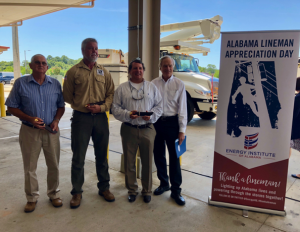Specialty Vehicle Tag Unveiled; Heroes Receive Outstanding Service Award
On June 4, approximately 100 linemen, elected officials and utilities leaders attended EIA’s Lineman Appreciation Day, held at the Alabama Power Company Crew Headquarters on Gunter Park Drive in Montgomery.
One of the highlights of the event was the unveiling of a new vehicletag.
“I am delighted to announce the creation of the Thank a Linemantag, which recognizes a group of people who work through good weather and bad to ensure that we have the electricity needed to enjoy our everyday activities,” said EIA Chairman Seth Hammett.
 Blake Hardwich, EIA executive director, added, “Our hopes that proceeds from the sale of the tag will benefit 501(c)(3) charities that support linemen, utility workers and their families.”
Blake Hardwich, EIA executive director, added, “Our hopes that proceeds from the sale of the tag will benefit 501(c)(3) charities that support linemen, utility workers and their families.”
Those wanting to purchase the tag may do so by visiting the Alabama Department of Revenue website, https://precommit.mvtrip.alabama.gov. Once the tag has received 1,000 pre-commitments, it will then go into production.
In honor of the utility professionals that go above and beyond, EIA representatives also presented the organization’s first Outstanding Service Award to not one, but three exceptional individuals.
In the aftermath of Hurricane Irma last September, Baldwin EMC’s Kevin Dorman and Louis Ruffin were working 16-hour shifts near Gainesville, Fla., helping Clay Electric Cooperative restore power to its members. Baldwin EMC Vice President Jody Taylor learned that a resident of the affected area, 74-year-old Carol Grozier, had been without power for three days. More importantly, she had been without power for her medically prescribed oxygen concentrator. Taylor located Dorman and Ruffin’s Baldwin EMC truck nearby and the two linemen installed a life-saving generator to power the oxygen concentrator until electrical service could be restored a few days later. The actions of Taylor, Dorman, and Ruffin likely prevented a medical emergency for Grozier.
 For their willingness to provide emergency assistance and commitment to their profession, the Hammett (far right) presented Energy Institute of Alabama awarded its Outstanding Service Award to Louis Ruffin (retired), Kevin Dorman (lineman) and Jody Taylor (vice president) of Baldwin EMC.
For their willingness to provide emergency assistance and commitment to their profession, the Hammett (far right) presented Energy Institute of Alabama awarded its Outstanding Service Award to Louis Ruffin (retired), Kevin Dorman (lineman) and Jody Taylor (vice president) of Baldwin EMC.
“As we recognize the heroic acts of these three selfless individuals, it is important to honor all linemen for their contributions and bravery.” said Hammett.
The event attracted coverage from around the state, including WSFA, WAKA,Yellowhammer and the Alabama News Center, just to name a few.
EIA Releases Water Safety PSA
The Energy Institute of Alabama recently released a public service announcement which highlights the need of water safety and accident prevention. The PSA features Jimmy and Casey Johnson whose daughter, Carmen, drowned close to their lake house pier.
To watch the video, click here.
Biofuels are Still an Important Component of Our Energy Mix
By: Dr. Steven Taylor, P.E.
Professor and Associate Dean for Research
Samuel Ginn College of Engineering
Auburn University
 During the last 15 years, biofuels have been a hot topic in the energy production world. You could hardly turn on the television or radio without hearing about the latest research and benefits of biofuels, which can be produced from agricultural and forest residues and dedicated energy crops. In fact, to help encourage the development of biofuel technologies, Congress provided tax breaks and incentives for companies that produced and sold biofuels.
During the last 15 years, biofuels have been a hot topic in the energy production world. You could hardly turn on the television or radio without hearing about the latest research and benefits of biofuels, which can be produced from agricultural and forest residues and dedicated energy crops. In fact, to help encourage the development of biofuel technologies, Congress provided tax breaks and incentives for companies that produced and sold biofuels.
Times have changed, though, and biofuels are not a front-page story today. Presently, natural gas is the darling of the electrical power industry for baseload operations. It’s clean, relatively inexpensive and readily available. Many power plants and manufacturing facilities are converting their old boilers to burn natural gas. Natural gas is on a high and there’s no forecast to determine when it will come down.
But for a moment, let’s reexamine biofuels, as they can still play an important role in our state’s energy production and economic development. According to the Energy Institute of Alabama, our state ranks fifth in the nation for electricity generation from biomass-based fuels. Biomass consists of plants or plant-based materials such as agricultural crop residues, forest residues, or dedicated energy crops such as switchgrass or fast-growing trees. These various sources of biomass can be used not only for generating electrical power or making liquid transportation fuels like gasoline or diesel fuel, but they can create a wide assortment of co-products like plastics and adhesives.
Here at Auburn University, we are conducting research to maximize the usage of biomass for conversion to biofuels and valuable coproducts. While most people think of corn-based ethanol when biofuels are mentioned, researchers at Auburn are advancing the technology to convert grasses, pine trees and hardwoods to gasoline, diesel, and jet fuels. And to make the fuel production process more economically feasible, we are developing a suite of co-products that can be produced at the same time.
Through grants from Alabama Power Co., the Electric Power Research Institute, the U.S. Department of Energy and the U.S. Department of Agriculture, we have been addressing many of the challenges in using biomass to create renewable biofuels and electrical power. One of the greatest challenges with biomass-based fuels is logistics. Forest and agricultural biomass is usually scattered and is difficult to collect and transport cost-effectively using traditional harvesting machines and trucks. In projects sponsored by the Departments of Energy and Agriculture, we have developed innovative and efficient ways to collect and transport the biomass from its original site to a power plant, refinery, or manufacturing facility. Other research is developing biochemical and thermochemical methods to convert the biomass to liquid fuels, chemical products, and electrical power.
Auburn researchers are also tackling the challenge of capturing gases emitted from landfills. Currently, it’s cheaper to flare the landfill gas than it is to clean and transport it to another location for re-use. Our faculty have developed methods to remove unwanted sulfur from the gas which then makes the gas valuable for production of electrical power or liquid fuels. Additional research has developed smaller-scale, more cost-effective reactors that can convert this gas to gasoline and diesel. Once these processes have been perfected, it will not only allow electric utilities and fuel producers another viable option in clean fuel choices, but the resulting new industries will open the door for more employment opportunities, particularly in our rural areas where forest and agricultural biomass is produced.
As you can see, these are exciting times for Alabama’s energy industry. We are continuing to expand our diverse energy base, while finding new ways to utilize resources already in place. Biomass and the resulting biofuels can and will continue to play an important role in adding to our resource mix.
Energy Institute Affiliate Spotlight
 Why we joined EIA: “We joined the Energy Institute to better coordinate and service Alabama’s energy shipper needs through efficient, cost competitive transportation solutions. Abundant and affordable energy powers Alabama’s economy, and the Alabama State Port Authority recognizes its critical role in product movement for Alabama’s energy-based industries,” said James K. Lyons, director and chief executive officer.
Why we joined EIA: “We joined the Energy Institute to better coordinate and service Alabama’s energy shipper needs through efficient, cost competitive transportation solutions. Abundant and affordable energy powers Alabama’s economy, and the Alabama State Port Authority recognizes its critical role in product movement for Alabama’s energy-based industries,” said James K. Lyons, director and chief executive officer.
About us: Alabama’s only full-service seaport, at the Port of Mobile, is the nation’s 10th largest seaport in total trade. Alabama’s seaport is also a federally designated Energy Transfer Port due to the volumes of coal, petroleum, petroleum products, and power generation equipment and components handled through the port each year. The Alabama State Port Authority oversees the public seaport terminals and services that connect Alabama shippers to major global markets. Since 2000, the Port Authority’s nearly $1 billion in port infrastructure investments have provided Alabama business and industry with efficient, cost effective transportation solutions. Modernization efforts to deepen and widen the harbor to accommodate the larger ships servicing U.S. markets are underway so that Alabama businesses can maintain their competitive shipping advantage.
Chairman, Senator to Speak at Conference
Alabama will be well-represented at The Energy Council’s State and Provincial Trends in Energy and Environmental conference later this month in Canada as two of our very own will be on the agenda.

 EIA Chairman Seth Hammett will be sharing his experience and expertise during his presentation, “Helping States Assure Reliable, Affordable and Clean Energy.”
EIA Chairman Seth Hammett will be sharing his experience and expertise during his presentation, “Helping States Assure Reliable, Affordable and Clean Energy.”
Senator Cam Ward, who represents Alabama District 14, is the chairman of the Center for Legislative Energy and Environmental Research and will deliver the conference’s opening remarks.
